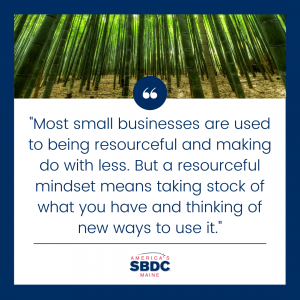The second in a series of blog posts of what the small business community learned from COVID-19. This week we are exploring what it takes to pivot successfully? And why can some businesses in the same industry do this better than others?
The word “pivot” was heard repeatedly throughout the pandemic. And while sometimes overused, it accurately describes the ability of a business to change course and adapt to a shifting environment.
While a global pandemic is hopefully a once-in-a-lifetime event, change is constant. New competition, changing consumer behavior, supply channel disruptions, technological advances, and shifting economic conditions mean that small businesses must be ready to change course quickly.
The good news is that small businesses are in a much better position to do this than big companies because of their size. After all, when the management team is small, it means faster decision-making. It also means knowing how to do more with less. Resourcefulness and creativity in the small business community have led to some of the greatest ideas in the marketplace.
What does it take to pivot successfully?
While there is no single reason why some businesses are better at this than others, stories gathered over the last year helped identify commonalities that are worth considering.
Flexible and Willing Attitude
Businesses that accept change as a normal part of life will be in a much better position to navigate and even profit from change. Adopting a growth mindset and being on the lookout for new opportunities will make it easier to pivot when challenges arise. This means being willing to add new products or services; offer new delivery methods or try a new marketing strategy —even when things seem to work just fine.
Creative Problem Solving
Business owners often think they’re responsible for coming up with all the answers. But creative problem-solving means listening to other people. The most successful businesses regularly solicit feedback from employees and customers and ask them for their ideas. Coming up with new solutions also means being empathetic by putting yourself in your customer’s shoes and asking what they need.
Excellent Communication
Your customers, employees, and vendors are your greatest advocates and they need to be kept informed. Communicating regularly and effectively makes it much easier to change course when you need to. During the pandemic, some small businesses just waited to see what happened and didn’t communicate. This forced customers to come to their own conclusions, sometimes assuming the business had closed and finally seeking out the competition. Even if you don’t have a perfect or fully formed answer it’s better to keep people in the loop. They’ll be more understanding when you change your prices, hours of operations, level of service, delivery times or other details.
Technological Adaptability
Rapidly changing technology can be tough to keep up with and demands constant learning. But being ahead of the curve will set you up for a successful pivot. For example, customers now expect touchless payment methods or the ability to buy your product online and have it delivered. These changes are here to stay and businesses that don’t offer these options are likely to turn customers away. Take the time to observe the trends in your industry and create a line item on your budget for inevitable software and hardware upgrades.
Resourcefulness, Relationships and Collaboration
Most small businesses are used to being resourceful and making do with less. But a resourceful mindset means taking stock of what you have and thinking of new ways to use it. For many businesses, their greatest asset is the relationships they have with others. During the pandemic, this led businesses to work collaboratively to come up with new products and services, and has led to entirely new ideas that are here to stay.
Complimentary Revenue Streams
Businesses that relied heavily on one product or service or one customer base found themselves scrambling during the pandemic. Farms and food producers who relied on the restaurant industry had an especially hard time. Identifying and having a niche in your industry and knowing who your customers are, is essential. But identifying products or services that compliment your mission can expand your customer base and set you up for greater stability.
What does pivoting look like in real life?
Check out these stories from Maine SBDC clients who show what pivoting looks like in real life.
Tunetown Music Gear
John and Pam Edwards, owners of Tunetown Music Gear had to stop all retail and in-person music lessons at the start of the pandemic. They pivoted by offering curbside pickup, home delivery, and virtual live music lessons. They credit their success to customer support and communications, creative problem solving, and offering complementary products to increase revenue. Read more about Tunetown here.
WineWise
Erica Archer, owner of WineWise, a business that offers in-person wine, food and spirits-based experiences, worked with her SBDC counselor to brainstorm ideas to keep her business going during Covid 19. The key to her success has been collaborating with others. Learn more about Erika’s story here.
Rhonda Feiman, Acupuncturist
When the pandemic started, Rhonda Feiman was unable to offer her services as an acupuncturist to her long-time clients. Rhonda’s ability to think creatively and a willingness to be flexible have helped her clients and her business. Read more about Rhonda here. You can also read about Rhonda in the Bangor Daily News!
MyFit 24
Stacey and Jesse Coleman changed their business model faster than most businesses in the fitness industry. They credit their success to the use and understanding of technology, as well as good communication with customers and staff. Learn more about them here.
To learn more about our successful clients and get help for your small business visit our website!
To get confidential, no-cost advising services for your Maine small business, request advising.
Additional Articles on this topic
- From the Small Business Chronicle: The Advantages of Flexibility in an Organization
- From the US Chamber of Commerce: Pivoting your business to survive the pandemic
